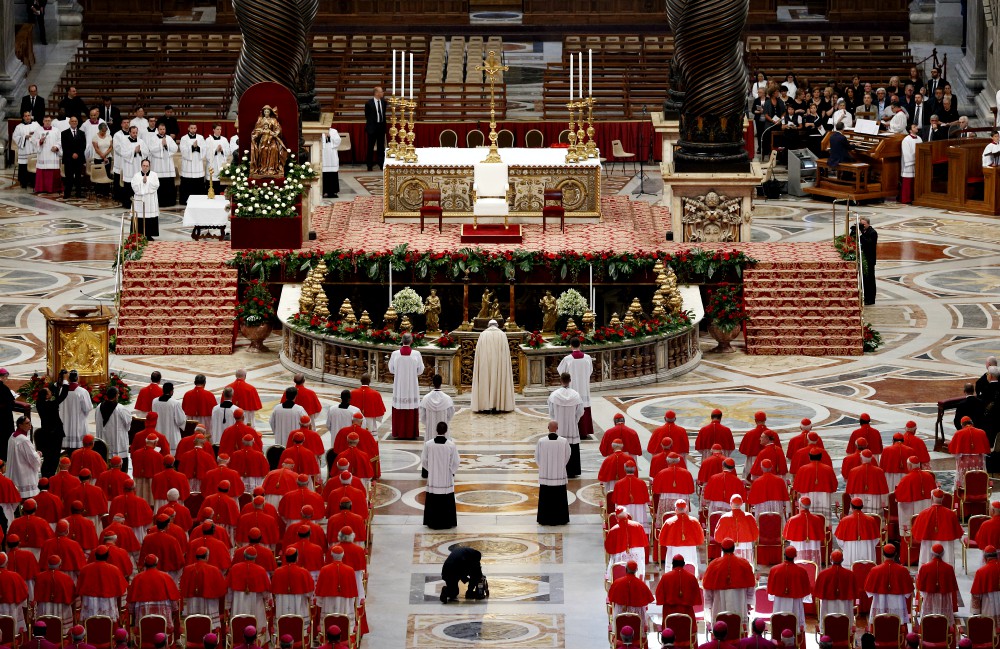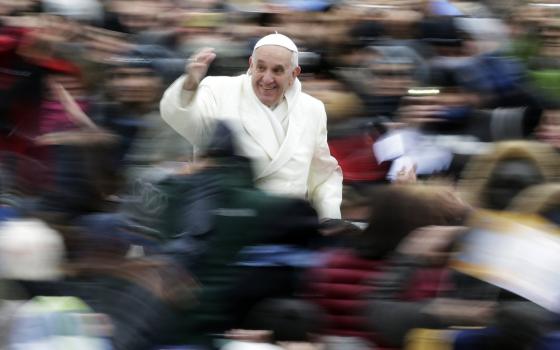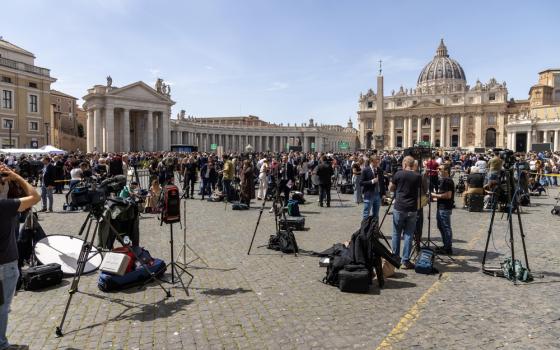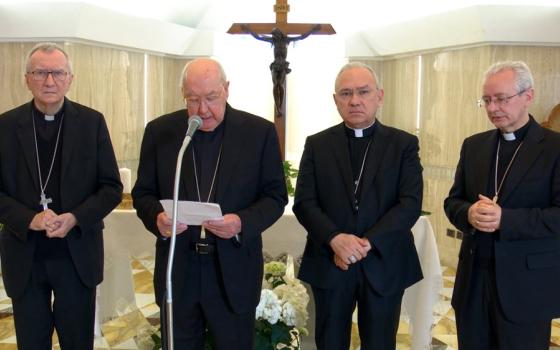
Pope Francis prays as he arrives for a consistory to create new cardinals in St. Peter's Basilica at the Vatican in June 2017. (CNS/Paul Haring)
Pope Francis' decision to name 13 new cardinals, of whom 10 will be eligible to vote in the next conclave, caught Vatican observers by surprise but perhaps it shouldn't have. There had been talk about holding a consistory in November or next February, but with many prelates coming to Rome in October for the upcoming Amazon synod, holding the consistory in conjunction with that event is not only convenient for many of the cardinals, it will serve to call attention to this synod.
This will be the first regional synod of Francis' pontificate and it will cope with many issues, but none larger than the unique role of the Amazon basin in protecting the global environment, an issue near and dear to the heart of this pope and his predecessor. Those Catholics who are upset with some of the things Francis has said and done need to acknowledge that on this issue, he is fully in line with the work undertaken by Pope Benedict XVI, who was known as "the green pope" during his pontificate.
The other reason Francis is putting 10 new electors into the college, even though the current composition stood at 118, only two short of the 120 members taken to be the norm? Maybe he saw news coverage of Supreme Court Justice Ruth Bader Ginsburg's latest bout with cancer. When you are dealing with cardinals, as with Supreme Court justices, you shouldn't wait too long to fill a vacancy. Besides, four cardinal electors hit the age of 80 in October so the total number of electors will be at 124 before the synod ends.
Many commentators have noted that Francis has now appointed 53% of the cardinal electors, and that he has definitely made his mark on the body that will elect his successor. But we should be cautious about predicting certain, particular consequences from that fact.
For example, the conclave that elected Francis consisted of cardinals who had been appointed by either Pope John Paul II or Pope Benedict XVI, yet the choice of Francis was clearly a choice to move in a different direction. Ideological consistency, I would submit, is not at the top of concerns for most cardinal electors in conclave.
"After a fat pope, a thin pope." This Italian saying captures a truism about papal elections: Cardinal electors understand that there needs to be a balance, that sometimes the church needs more strident leadership and other times more conciliatory leadership. Through much of the modern papacy, the balancing act was between diplomats and pastors, although even there the categorizations are not precise: Most people would think of Pope John XXIII as the quintessential pastor, but he spent most of his career as a diplomat.
The most significant change in the College of Cardinals that Francis has effected is not so much ideological as it is geographic. There are now fewer cardinals from Western Europe and North America and more from Africa, Asia and Latin America. The shift is not right vs. left but North vs. South. And with that shift comes a shift in ecclesiological focus. A bishop in North America or Europe certainly spends a considerable amount of time focusing on how the church can minister to the poor. In the Global South, ministering to the poor is an essential part of all tasks.
Advertisement
In the U.S., the culture warriors on the right focus on fidelity to traditional sexual morality. Culture warriors on the left focus on the same issues, albeit reaching the opposite conclusions. But if you are a cardinal from Indonesia or Guatemala or Congo, restricting or enlarging LGBT rights is not at the top of your agenda. Making sure your flock does not go hungry matters more than whom they go to bed with.
When clergy from the Global South do focus on issues related to sexual identity, they tend to be more conservative, not less so. Conservative fears that Francis is paving the way for overturning the church's traditional teachings on sexual morality seem very misplaced.
Nor is the difference Francis is making, in his papacy generally and in his choice of new cardinals specifically, simply a matter of focusing more on poverty and less on sexual morality. Some higher clergy think that the problem facing the church is an intellectual problem, that evangelization really is about better apologetics, that if the church were to do a better job of explaining her teaching, people would come flocking. Francis understands that the Gospel calls for witness more than explanation, that evangelization is the work of pastors more than professors, that credibility will be found in the way we live, not in the way we talk. Bishop Alvaro Ramazzini of Huehuetenango, Guatemala, was made a cardinal. Los Angeles Auxiliary Bishop Robert Barron was not.
The list of new cardinals joins a long line of decisions made and texts written by this pope, all of which suggest a new breeze is blowing through the Catholic Church. The words of Isaiah come to mind, and not for the first time in this pontificate: "Behold, I am doing something new. Do you not perceive it?"
If it can be said that the last two pontificates clarified the teaching of the Second Vatican Council, this pontificate is clarifying the mission of Vatican II: Proposing anew, to the women and men of our time, the kerygmatic essence of the Gospel: Jesus comes to bring good news to the poor and liberty to captives.
[Michael Sean Winters covers the nexus of religion and politics for NCR.]
Editor's note: Don't miss out on Michael Sean Winters' latest. Sign up and we'll let you know when he publishes new Distinctly Catholic columns.







